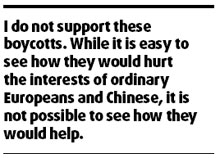Living with China crucial for the whole world
By Peter Mandelson (China Daily)
Updated: 2008-04-18 07:33
Updated: 2008-04-18 07:33

Last time I was in China I was told that the boom in construction in Shanghai is so intense that its street maps have to be redone every few months.
It's a useful image for China itself - because China is the boom that is redrawing the map. It's redrawing the economic map.
When we in Europe and the US see China from the outside, we see an export powerhouse. We also see a market for our own goods and services.
As one nineteenth century Englishman put it: if everyone in China lengthened their shirt tails by a foot, the textile mills of England would spin for a year. The twenty-first century version would run: if everyone in China drove a Volkswagen. Or drank Bordeaux. Or had a Barclays bank account. Which they may yet.
China should transform its superheated growth model into something that is economically more balanced, and environmentally more sustainable.
The mistake would be to imagine that we in Europe, and in the US don't have a stake in China's successful transformation. We have the biggest stake imaginable.
Whatever our political differences, our interdependence remains a central fact of the global political economy.
China is taking up a lot of the slack in a slowing world economy. It is the indispensable partner for a serious climate change strategy. It will reshape the political dynamic in the UN, in Africa, and in Asia.
As China grows, so will our mutual interests. Our need to help China come to terms with the vast challenges it faces will grow.

I say this because some appear to assume that a course of direct confrontation in connection with the Olympics and Tibet serves our interests. But our concerns, our protests must go hand in hand with a strategy for ensuring that China continues to look outward.
There is only one thing more frightening than China's exponential growth. It is that growth suddenly stalling or crashing. China's economic failure would be catastrophic - for China and for us.
We will not be able to dictate the solutions to China's problems. But we do not have the luxury of ignoring them either. We must also not lose sight of the fact that we are bound to work with China, to live alongside China, to help China succeed. China faces huge pressures from within and without. The industrial policies that drove its development to date are being rethought, and this will affect how we invest in China in the future. China is searching not just for a presence in global markets, but for outlets for its products in global brands.
The capital model that underwrote the Chinese boom is pressing against the limits of sustainability. The Chinese banking sector is hobbled with high levels of bad or highly vulnerable debt.
The export sector is overheated by cheap capital. Foreign exchange reserves are being accumulated at unsustainable and inflationary levels.
Domestic demand, suppressed by a weak currency and high levels of precautionary saving, is still extremely low. Inflation is serious, especially in food prices.
A quarter of a billion people will move into cities in the next twenty years. The infrastructure boom that this is creating will put intense pressure on China's environment. The tensions between the needs of a new urban class and those who stay on the land could become a growing problem.
China needs to be a constructive part of a global strategy. This will be a central theme of the visit by President Jose Manuel Barroso, and members of the European Commission to Beijing next week.
As the dollar falls against the yuan, the bulk of China's export growth is now being absorbed by the EU.
So in Europe, we face booming imports and constrained export growth. That spells growing anxiety, and frustration. The wave of Chinese investment on the horizon risks deepening those anxieties.
Europeans will only accept an open trading and investment relationship with China.
The overwhelming interest of Europe, indeed of the world, is that China deals with these challenges effectively and responds to those expectations. But getting Beijing's attention means pitching our expectations right and recognizing the balances that Chinese policy makers are trying to strike, and the speed at which they can move.
In Beijing next Friday, the EU and China will launch a new High Level Mechanism for managing their longer-term trade and economic relations. On the Chinese side it will be chaired by Vice-Premier Wang Qishan. A delegation of seven commissioners will attend the inaugural meeting.
Like the US Strategic Economic Dialogue with China, the real value of this mechanism lies not just in its ability to help us manage and resolve frictions, but in the institutional framework that it creates for senior policymakers.
Managed well, an institutional channel of communication ensures that the EU and China keep talking and acting on trade and economic issues - even when they have strong differences.
It's important that this was a Chinese initiative - a response to the growing concerns about the spiraling trade deficit and barriers to trade. Many of the issues that will be high on the agenda are central to China's interests as well as ours.
But for the mechanism to work, China will have genuinely to engage. China has had the courage to bring both sides to the table. If it has the further measure of courage to seriously engage, then both sides can win. If they do not, they risk a lot more exhausted patience in Europe.
Improving the situation is clearly in the interests of both sides.
The same goes for investment in China. China wants FDI, and it also wants to become a major investor abroad in its own right. But EU investors in China still face ownership caps, onerous local partner requirements and other restrictions.
Last year, for the first time in a decade, EU investment volume in China actually fell. Part of that is probably cyclical - but it is not a coincidence that the European Chamber of Commerce last year released its most critical report ever about the Chinese investment climate.
China gains little by driving away European capital. Given the need to strengthen the Chinese banking and insurance sectors, if China is to develop durable capital markets, the experience of European banks and financial services firms is invaluable.
We are also shut out of telecoms markets - despite China's WTO obligation to open its license system to foreign providers. Europe is committed to maintaining an open market for Chinese investment, which is only going to grow in the years ahead.
Even on an issue like the trade deficit we can agree on a few fundamentals. The deficit reflects a number of things, not all linked to restrictions in the Chinese market.
It is a result of the shift of European supply chains into China from other parts of Asia. But it is also a symptom of insufficient domestic demand that leaves the Chinese economy heavily skewed toward exports.
We want China to strengthen consumer purchasing power by maintaining the gradual appreciation of the yuan and the development of stronger social safety nets that allow ordinary Chinese people to reduce their huge levels of precautionary saving.
But that is also the only way for China to develop strong services and retail economy and slow its inflationary accumulation of hard currency reserves.
These are defining questions for the EU-China economic relationship. But what is important about them is that they are all rooted in shared strategic interests. That does not necessarily mean that they will be easy to resolve. But it does mean that we have a common ground on which to work.
Inevitably, people will ask how our trade relationship should sit in our wider political relationship with China. I do not think that it is possible or desirable to wall off trade from the rest of our ties with China.
It is to be expected that some on both sides of an issue like Tibet will call for boycotts of one kind or another. I do not support these because. While it is easy to see how they would hurt the interests of ordinary Europeans and Chinese, it is not possible to see how they would help.
What we know for absolutely certain is that if we really want to shape the twenty-first century, we have to shape it with, not against, China.
There is no getting away from that. And our policies, and our behavior, and China's too, need to be conditioned by that reality.
The author is EU trade commissioner
(China Daily 04/18/2008 page9)
|
|
|
|